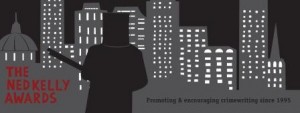This week, The Column asks Alec Patric, winner of the 2011 SD Harvey Short Story Award about writing short Australian crime.
I spent years reading prose that was lit up with insights and revelations. Dense with psychological verisimilitude. That exposed all the nuances of our most precious relationships. Years with tortured prose that demanded a kind of attention and dedication not seen outside the study of physics, linguistics and theology.
It occurred to me that this is not why I started reading or writing. That there was something more basic. There was a spell writing cast over another person’s mind. It was what I was really looking for as a reader, and a writer. It’s the creation of a compelling reality we can call narrative but it’s nothing more complicated than the need for pure storytelling.
I became fascinated with books that compelled us to turn pages. Crime writing is the purest of narrative forms in this respect. There’s no other genre, (including the literary fiction genre), that focuses more resolutely on the great events and challenges of our daily lives. It might seem absurd when looked at from the perspective of suburban lives, entertained by the violence and mayhem of Crime, but our lives are always on the verge of death, no matter how comfortable they may seem. Even in regular workplaces, emotionally, the day to day can feel life and death.
I hadn’t consciously decided to write a genre Crime story before I wrote ‘Las Vegas for Vegans’ recently. It had already started forming as an idea on the page before I found out about the Ned Kelly award for short fiction. I knew they gave out the award of course, for novels and the like, but it gave my emerging story incentive and focus.
Once I’d decided to have a go at the award, I wanted to write a genre piece that would fit a classic definition. I wanted to write something with a terrible murder and a surprise ending. I wanted to have a hit man and a prostitute and I wanted them to dwell in a harsh, gritty, ‘noir’ landscape. Las Vegas was the perfect place to set my story.
As soon as you start writing something like this, you find that clichés are not just risks of lazy sentences and poorly realised ideas, but are the actual figures you are playing with. There’s just no way you can write a hit man or whore that hasn’t been done before. A protagonist in a crime story will be defined by the crime, but all you can do is tweak a few features in the bio.
Ian Rankin’s John Rebus loves fashionable rock music, and Robert Crais’ Elvis Cole practices yoga. Features like these seem ridiculous in isolation, but the authors are desperately attempting to escape cliché. With James Lee Burke, his character Dave Robicheaux is an alcoholic, ex-soldier, disillusioned cop, etc, etc. James Lee Burke is a superb writer and it’s all believable and compelling, but where he really distinguishes himself is in the detailed evocation of New Orleans; its landscape and culture. So while crime writers play with clichés from beginning to end, they have to find something unique in the way they fulfil genre expectations.
In ‘Las Vegas for Vegans’ I wasn’t interested in the casinos, the decadence, or any of the clichéd perspectives of Vegas, though I do play with the post card images we all have of ‘Sin City’. I became entranced with the idea of a fabulous palace in the middle of a desert. Emotionally, it was the perfect place for my character, but also for myself. Anyone who practices art within our culture, with its corporate culture and social materialism, its predictable obsessions with sport and cargo-cult fascination for celebrity, is living within an artistic desert. ‘Las Vegas for Vegans’ is a term that sums up what it feels like being a writer in Australia at the moment.
But to be honest, we go blindly into these narrative structures searching for other, less tangible details. So for me, what I was reaching for is this sense that some of us live in the light of ideals (a noble sense of caring for the planet and its life forms as passed down to my hero from his parents), or within a sense of order and justice (the virtuous won’t get terrible diseases and/or kill themselves in utter defeat) for basic functions of humanity (being a husband and father) and without these ‘lights’ the world becomes an endless afternoon stretching into evening.
As unfashionable as it may be, ‘Hemisphere Travel Guides: Las Vegas for Vegans’ even has a moral to its story: tend to life in all its details, nourish your soul, care for those around you as far as that’s within your power to do so. I know, a little touchy-feely, but I really do believe we live by the lights of things such as ideals, compassion and connection. I’m not sure if I’d recommend any of these things to writers wanting a long career in crime writing but that’s what went into writing ‘Hemisphere Travel Guides: Las Vegas for Vegans’.

